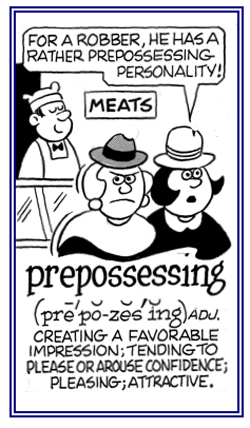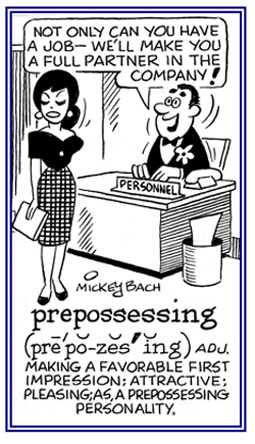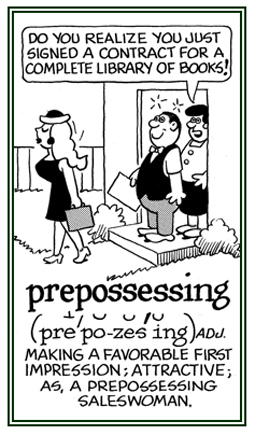sed-, sedat-, -sid, -sess
(Latin: sit, sitting)
possess (verb), possesses; possessed; possessing
1. To have as property; to own: The elderly Mrs. Smith does not possess a cell phone and only uses her landline.
2. To have as a quality, characteristic, or other attribute: Shirley possessed great tact and politeness.
3. To acquire mastery of or have knowledge of: Harry possessed valuable data that his employer was looking for.
4. To gain or exert influence or control over; to dominate: Jim thought he possessed his wife, but he was wrong because she divorced him within a year of marriage.
5. To cause to own, hold, or master something; Mr. Black possessed the property, but he was not the owner of it.
2. To have as a quality, characteristic, or other attribute: Shirley possessed great tact and politeness.
3. To acquire mastery of or have knowledge of: Harry possessed valuable data that his employer was looking for.
4. To gain or exert influence or control over; to dominate: Jim thought he possessed his wife, but he was wrong because she divorced him within a year of marriage.
5. To cause to own, hold, or master something; Mr. Black possessed the property, but he was not the owner of it.
Professor Hathaway possessed a great amount of knowledge in the field of astronomy. .
6. To cause to be influenced or controlled: The idea of going on a trip to California to see his relatives possessed Sam so much that he decided to go there in the summer.
His agitated emotions towards his father totally possessed him.
7. Etymology: from Middle English possessen; from Old French possessier, from Latin possessus, past participle of possidere, "to possess"; which stands for pots, "mighty, powerful" + sidere, literally "to sit as a master".
The act or fact of having or owning something: Doris put all of her personal possessions which she thought were needed for her trip into her suitcase and made sure that it didn’t weigh more than the allowed amount for the flight to Canada.
possessive (adjective), more possessive, most possessive
1. Pertaining to a wish to control someone exclusively or to be the sole object of another person's love.
2. Relating to a tendency not to share things with others.
3. In grammar, showing ownership in grammatical terms or indicating grammatical ownership; for example, in pronouns, "his" or "her".
2. Relating to a tendency not to share things with others.
3. In grammar, showing ownership in grammatical terms or indicating grammatical ownership; for example, in pronouns, "his" or "her".
possessively (adverb), more possessively, most possessively
Referring to ownership or control of something.
prepossess (verb), prepossesses; prepossessed; prepossessing
1. To preoccupy the mind to the exclusion of other thoughts or feelings: Jack was prepossessed and consumed with sorrow of losing his wife in the car accident.
2. To influence beforehand against or in favor of someone or something; to prejudice: Joan's mother was quite biased and prepossessed of her daughter being the most beautiful girl in her class at school.
3. To impress favorably in advance or beforehand: Seeing the young and beautiful violist on stage prepossessed the audience even before she started playing!
2. To influence beforehand against or in favor of someone or something; to prejudice: Joan's mother was quite biased and prepossessed of her daughter being the most beautiful girl in her class at school.
3. To impress favorably in advance or beforehand: Seeing the young and beautiful violist on stage prepossessed the audience even before she started playing!
prepossessing (adjective) (usually not comparable)
1. Creating a pleasing, attractive, or favorable impression: Ann's grandson is a prepossessing musician who has talents that people like very much.
2. Etymology: from Latin, "to get possession of beforehand", from pre-, "before" + possess, "have, hold"; meaning "to possess a person beforehand with a feeling, notion, etc."; specifically, "to cause people to have a positive feeling about something or another person".

© ALL rights are reserved.

© ALL rights are reserved.

© ALL rights are reserved.
Go to this Word A Day Revisited Index
2. Etymology: from Latin, "to get possession of beforehand", from pre-, "before" + possess, "have, hold"; meaning "to possess a person beforehand with a feeling, notion, etc."; specifically, "to cause people to have a positive feeling about something or another person".



Go to this Word A Day Revisited Index
so you can see more of Mickey Bach's cartoons.
prepossessingly (adverb), more prepossessingly, most prepossessingly
1. Characterized by impressing someone favorably; pleasing.
2. Referring to the attraction of confidence, favor, esteem, or love.
2. Referring to the attraction of confidence, favor, esteem, or love.
1. The condition of being preoccupied with feelings, thoughts, opinions, or objects: Doug's immersion and prepossession in learning about reptiles quite impressed his parents!
2. An opinion formed beforehand without adequate evidence: Mrs. Smart was absorbed with the prepossession that she wasn't going to like her new job even before she met her colleagues and boss, who were actually very nice people!
2. An opinion formed beforehand without adequate evidence: Mrs. Smart was absorbed with the prepossession that she wasn't going to like her new job even before she met her colleagues and boss, who were actually very nice people!
preside (verb), presides; presided; presiding
1. To be officially in charge; to hold the position of authority; act as chairperson or president: Max was appointed to preside as the chairperson of the school board.
2. To have control; to be the most powerful person or the one everyone else obeys, usually in a specific place or situation: Tom is scheduled to preside over the business when the current chairman retires.
3. To perform as an instrumentalist: Mary was the featured musician at the musical performance where she presided at the organ.
4. Etymology: From Latin præsidere, "to stand guard, to superintend"; literally, "to sit in front of"; from præ-, "before" + sedere, "to sit".
2. To have control; to be the most powerful person or the one everyone else obeys, usually in a specific place or situation: Tom is scheduled to preside over the business when the current chairman retires.
3. To perform as an instrumentalist: Mary was the featured musician at the musical performance where she presided at the organ.
4. Etymology: From Latin præsidere, "to stand guard, to superintend"; literally, "to sit in front of"; from præ-, "before" + sedere, "to sit".
1. The job or function of the head of a republic: The presidency is an office or a position of considerable consequence and responsibility and of great magnitude.
2. The term or length of a chief executive's office: During his presidency, Donald Trump has greatly upset a great number of people living in the states.
2. The term or length of a chief executive's office: During his presidency, Donald Trump has greatly upset a great number of people living in the states.
1. Someone who is appointed or elected to preside over an organized body of people, such as an assembly or meeting: An enormous number of presidents over the world have usually been men.
2. The chief executive of a republic: Countries that have no king or queen have a president as the head of that nation.
3. The chief executive of the United States, serving as both chief of state and chief political executive: President Donald Trump has been the administrative leader of the USA since 2016.
4. The chief officer of a branch of government, corporation, board of trustees, university, or similar organization: Mr. Smith has been the president or director of the company for many years and has been respected by all of the workers.
5. Etymology: from Latin præsidentum, præsidens, "president, governor, chosen leader of a body of people"; noun use of præsidere, "to act as head or chief"; literally, "to sit in front of"; from præ-, "before" + sedere, "to sit"
2. The chief executive of a republic: Countries that have no king or queen have a president as the head of that nation.
3. The chief executive of the United States, serving as both chief of state and chief political executive: President Donald Trump has been the administrative leader of the USA since 2016.
4. The chief officer of a branch of government, corporation, board of trustees, university, or similar organization: Mr. Smith has been the president or director of the company for many years and has been respected by all of the workers.
5. Etymology: from Latin præsidentum, præsidens, "president, governor, chosen leader of a body of people"; noun use of præsidere, "to act as head or chief"; literally, "to sit in front of"; from præ-, "before" + sedere, "to sit"
presidential (adjective), more presidential, most presidential
1. Relating to the position of the head of a government or some other organization.
2. Done in the manner of a chief executive, or having the appearance of a leader.
2. Done in the manner of a chief executive, or having the appearance of a leader.
presidentially (adverb), more presidentially, most presidentially
In a manner that resembles or is characteristic of the head of a government, a business organization, etc.
1. Someone who exercises guidance, direction, or control.
2. Anyone who acts as leader, chairman, or moderator.
3. A person who occupies a position similar to that of the highest position in an organization
2. Anyone who acts as leader, chairman, or moderator.
3. A person who occupies a position similar to that of the highest position in an organization
repossess (verb), repossesses; repossessd; repossessing
1. To take back goods or property from a buyer who has failed to keep up the payments on them.
2. To take back property through judicial methods, a foreclosure, or legal means because required payments have not been made.
2. To take back property through judicial methods, a foreclosure, or legal means because required payments have not been made.


